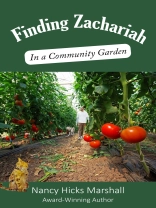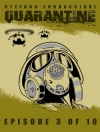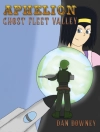Who knew a feral cat named Sebastian could observe and share so many different insights about human behavior- all within a formerly abandoned lot?
FINDING ZACHARIAH allows you to capture the spirit of what is possible in a community garden. While this remarkable story is fiction, it is based on true events. Imagine a veteran with PTSD, who has fallen into homelessness and thinks alcohol is his only friend – only to find a true friend in a feral cat, Sebastian. Then, imagine a family suffering from losing their dad to violence.
Finally, imagine the possible healing and reconciliation that can occur when volunteers work their own ‚road map‘ to turn their lives around – with the help of compassionate humans, the feral cat, and a service dog.
Many things go on in a community garden - mulch-making, seed-planting, pollinating, irrigating, nurturing – both plants and people, and reaping a bountiful harvest.
All this can occur even in Phoenix, Arizona, where you can plant in October and January, but not in May, and where you need to add nutrients and water to the parched desert soil.
Nancy has volunteered in two community gardens. She has learned up close what makes a garden work. First, all who participate learn skills and provide nutritious food for families. Even more important, she has witnessed the rich bonds of friendship that form among the humans – and their companions – who make the community garden an integral part of their lives.
Inhaltsverzeichnis
Author’s Afterword
Acknowledgements
Glossary
Questions for the Curious
Sources and Resources
Taxonomy Chart: Animals
Taxonomy Chart: Plants
About the Author
About the Artist
Über den Autor
Nancy Hicks Marshall grew up on Long Island, New York. Her father always planted an organic vegetable garden, from the ‚Victory Gardens‘ of World War II until his very later years. Moving to Phoenix in 1975, Nancy started a vegetable garden, finding the seasons and conditions dramatically different than that of the Northeast.First, it is possible in Phoenix to plant in the fall (early October is good) and again in the winter (January, February), but it is difficult to grow much during the summer months. Second, in the dry climate there is not much natural decomposition, so it’s important to add compost and other mulch to enrich and replenish the soil.Nancy has had the opportunity to volunteer in two community gardens in South Phoenix. The science of planting, weeding mulching, and irrigating is an ongoing challenge for all the gardeners and farmers. In addition, when numerous individual persons and organizations come together to try and make such a garden work on an ongoing basis, we humans face all kinds of challenges. Two main benefits of working in a community garden are that we both produce healthy food for families, and we develop vital skills and productivity.We hope FINDING ZACHARIAH has allowed you to capture some of the spirit of what is possible in a community garden.












